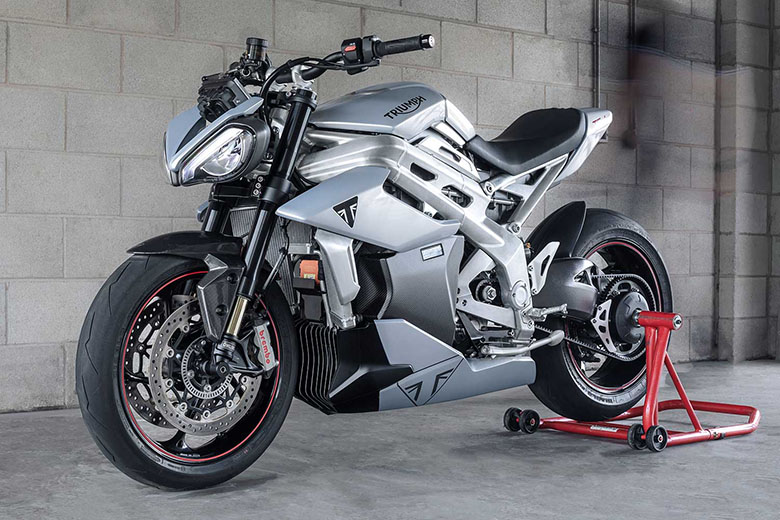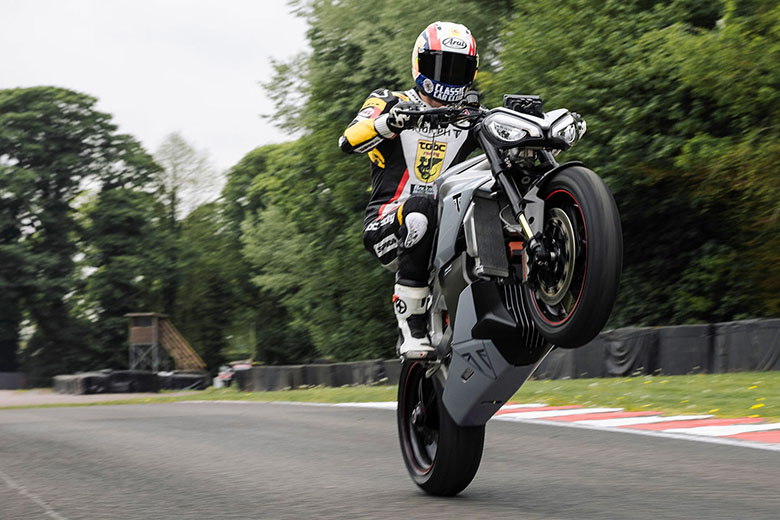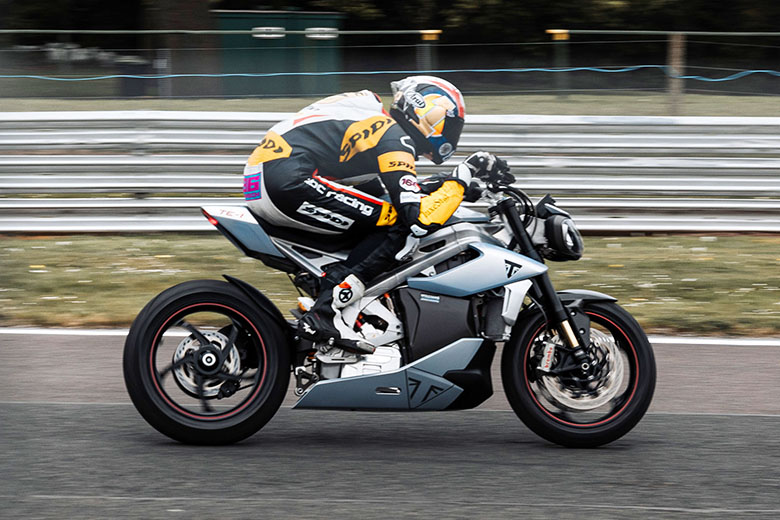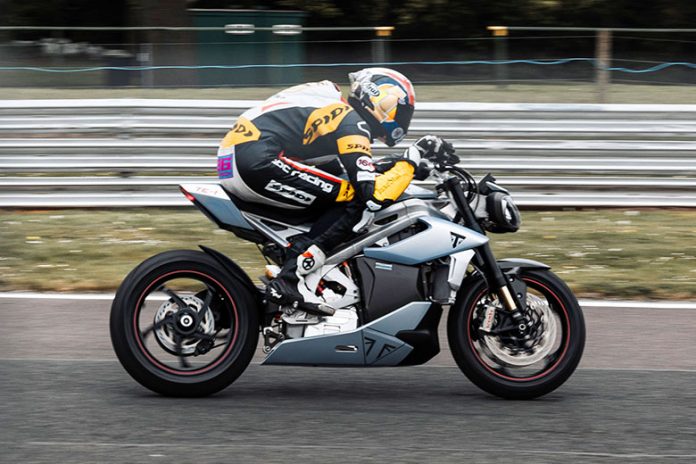The prototype demonstration for the TE-1 project has been entirely built and is ready for the project’s next stage, the live testing programmer, which Triumph will head.
Specialized electric motorcycle engineering and cutting-edge integrated technology design are the focus of a novel partnership between Triumph Bikes, Williams Progressive Engineering, Integral Powertrain Limited., and WMG at the University of Warwick, supported by the Office for Zero Emission Vehicles through Innovate Great Britain.

2022 Triumph TE-1 Phase 3 Prototype – Detail
Project Phase 3 Complete
The prototype demonstrator for the TE-1 project’s third phase is now complete. The prototype demonstration incorporates, for the first time, all of the newest and final advancements from the project partner work streams, including:
Frame, rear sub-frame, cockpit, panels, wheels, gearbox, Gates Carbon belt drive, electronics, Ohlins USD cartridge forks, one-of-a-kind prototype Ohlins RSU, Brembo M50 monobloc calipers, and Triumph motorcycle control software.
Last version of the WAE battery pack prototype from Williams Advanced Engineering, with specialized cell packaging for optimal center of gravity, vehicle control unit, DCDC converter, integrated cooling, charging port, and aesthetically pleasing carbon covers.
Powertrain with scalable combined inverter and combined motor using silicon carbide switching technology and integrated cooling, as shown in the final prototype’s “Integral Powertrain.”
All findings from the last pre-live trial simulation for WMG at the University of Warwick show that the project is on track to produce the expected performance and durability objectives.
Testing findings that surpassed existing standards and objectives established by the UK Automotive Council for 2025 are among the significant accomplishments of this part of the project, creating a solid foundation for the further improvement of electric motorbike performance.
The TE-1 project’s overarching goal has been the development of electric motorcycle capability, with the hope that it will serve as a basis for Triumph’s eventual electric motorcycle offering, spur innovation, increase capacity, generate new intellectual property, and raise the reputation and stature of British industry and design.

Project Phase 4 to Commence
Now that the prototype demonstration is finished, the TE-1 project may enter phase 4—live testing. The prototype demonstration will last six months through a rigorous live testing program at Triumph’s cutting-edge facilities.
To guide the prototype demonstrator’s final configuration and adjustment, the testing program has been developed.
Phase 4 Completion
The prototype demonstrator will get its final body panels and paint scheme in time for active track display and media interaction after the conclusion of the live testing phase, projected for the summer of 2022. The project’s full results, including the final specifications and testing outcomes, as well as insights and key facts on how the TE-1 satisfies the project’s innovation targets and sets new standards for the motorcycle sector as a whole, including the final battery and range performance, will be released at this time. The media will see the prototype on the track and speak with the team and the riders involved in the prototype’s development.
With the third and final prototype of the Triumph TE 1 motorbike now being put through its paces in real-world testing, it has been thrilling to see the project’s development. Triumph is pleased to have contributed to this ground-breaking British partnership. For my part, I couldn’t be happier with what we’ve accomplished so far with our partners, and I’m excited about what the future of electric vehicles might hold. Said Nick Bloor, CEO of Triumph. With the TE-1 demonstration prototype, “we look forward to continuing the ambitious and innovative work through the live testing phase and sharing the outcome including Triumph fans worldwide.”
Demonstrator Prototype
In the third stage, the Triumph TE-1 team built a mule bike that successfully combined the battery, inverter, engine, and chassis. To ensure that all the features and software aspects behave precisely and intuitively, as a customer would expect, all the project partners worked collaboratively using this platform to optimize software integration across complex systems. It was verified by extensive testing and simulations on a powertrain rig at WMG, which were used to evaluate safety-critical aspects of motor operation and vehicle control. To fully grasp the basic variations in electric motor load application for motorcycle use cases, efficiency, and repercussions to gear life, durability testing has also been performed on the main transmission. In tandem with this effort, Triumph has been leading the design of the unique chassis to ensure that it faithfully implements the goals established for its appearance in phase 2. Phase 3 of the project is complete, and the first photos of the finished TE-1 demonstration prototype are being released today.
Overview
Project TE-1 collaboration – Triumph Motorcycles, industry experts, academic leaders, and UK Government.
Triumph Motorcycles and the UK’s electrification specialists have been working together on Project Triumph TE-1 for two years to create innovative technological solutions and cutting-edge capabilities for electric motorcycles. Partners focused on developing breakthroughs in their respective fields:
In the project’s early phases of cooperation, Triumph Motorcycles served as the primary contributor, bringing cutting-edge knowledge in motorcycle chassis design and engineering, manufacturing, and pioneering functional safety systems. The demonstration vehicle’s calibration, handling, and tune will continue to be worked on by Triumph.
To create a novel battery management system paired with a vehicle control unit, Williams Advanced Engineering used its test and development facilities to give industry-leading lightweight battery design and integration expertise.
The e-Drive team of Integral Powertrain Ltd. was responsible for developing a scalable, high-power electric motor and silicon carbide inverter that could be housed in a single motor casing.
WMG at Warwick offered modeling and simulation based on future market demands, as well as expertise in electrification, to accelerate innovation from R&D to commercial effect.

Supporting the transition to zero-emission cars and providing financing for charge station infrastructure throughout the UK, the Office for Zero-Emission Vehicles (OZEV) works across the government. It will help the economy expand while decreasing greenhouse gas emissions and vehicular pollution in the United Kingdom. The Office of Low-Emission Vehicles (OZEV) operates under the umbrella of the Departments of Transport and Business, Energy, and Industrial Strategy.
To encourage business-led research and development financing and the expansion of businesses in the United Kingdom, the government established Innovate UK.
The project’s four primary stages are structured around the overarching goal of deeper system integration. The project has provided cutting-edge electric motorbike systems that decrease bulk, complexity, and packaging needs by creating separate components of automotive-based electric drivetrains and optimizing them into new combined units.
Together with its alliance partners, Triumph Motorcycles has rapidly increased its knowledge of battery safety, electric motor packing efficiency, braking system integration (including regenerative braking), and cutting-edge safety features. Triumph’s plan for electric motorcycles will benefit from the company’s research and development in these areas.
To help meet customers’ needs looking for lower environmental impact transportation while also delivering against the UK’s focus on reducing emissions, the Project Triumph TE-1 partnership has been working with the Office for Zero Emission Vehicles and Innovate UK.
Expertise and competence inside the UK workforce, producing jobs and a talent base that both provides sustainable employment and boosts the UK’s image and impact on the international stage. Commercially viable and sustainable collaborations with UK industry manufacturers and supply chains.

